Addressing Youth Mental Health Needs in Nigeria: A Peer-led Approach by Asido Foundation
By: Oluwayemisi Olaoluwa, Williams Owoeye, Oyetunji Ayoola, and Jibril Abdulmalik,Asido Foundation.
Nigeria is Africa’s most populous nation with an estimated 240 million citizens that is predominantly youthful, with 70% of her population below 30 years. It is also established that nearly 50% of adult mental disorders would have started by the age of 15 years. Thus, it should be a no-brainer that a focus on the mental health needs of youth should be a priority for Nigeria and indeed other low- and middle-income countries (LMICs). But regrettably, this is not the case.
Ignorance, superstitious beliefs, shame, stigma and discrimination prevent affected youth and their families from seeking the mental health interventions they need. Other barriers to mental health access include a paucity of mental health professionals and absence of school mental health programs, all of which culminate in poor health-seeking behaviour, and resultantly a high treatment gap (80%).
The Asido Foundation (www.asidofoundation.com) is the leading mental health not-for-profit organization in Nigeria, which blends a depth of mental health expertise, with a teeming army of passionate volunteers across the country. It places the mental well-being of children, adolescents and youths at the heart of its programming. This crucial youth demographic is often neglected, with their mental health issues allowed to fester and hinder fulfilment of their potentials. Recognizing the gap in mental health services for the youth, the Asido Foundation established the Asido Campus Network (ACN) under the Directorate of Youth Mental Health.
The Asido Campus Network is a community of students trained to provide peer-to-peer psychological first aid (PFA) while advocating for and promoting mental health awareness on their respective campuses. Over the past five years, ACN initially piloted at the University of Ibadan in 2020, and has now spread its tentacles across 7 institutions in Nigeria and currently boasts a membership of over 3,000 students.
Through the Asido Campus Networks, the Asido Foundation’s goal of addressing youth mental health challenges via awareness campaigns, drug abuse prevention, as well as suicide prevention activities is being realized. The members of the club, called Mental Health Ambassadors, collaborate across different tertiary institutions to design mental health programs that address their unique needs, with guidance and expert support from the Asido Foundation. A few of these youth-led initiatives are highlighted here.
The Asido Campus Network has conducted campus-based sensitization campaigns, such as the annual Suicide Prevention Walk, across several tertiary institutions including the University of Ibadan, Obafemi Awolowo University, and Ahmadu Bello University. These campaigns aim to raise awareness, promote empathy, and support towards addressing the rising cases of suicide among students.
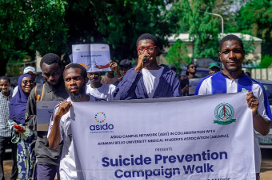
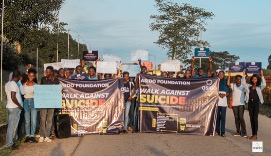
Figure 1 and 2: Participants in the Suicide Awareness Walk organized by Asido Campus Network across different tertiary institutions.
Other testaments to the impact of ACN on its members include winning a fully-funded grant to attend the International Youth Mental Health Conference in Vancouver in March 2025, producing participants of the Carrington Fellowship of the US Consulate, in Lagos, Nigeria among several other prestigious awards. The University of Ibadan chapter of the ACN has also been officially recognized by the school management as the most outstanding student organization for 2024.
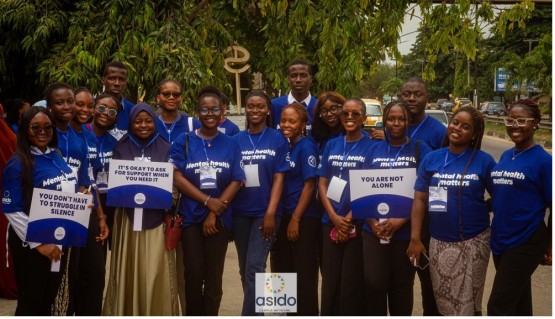
Fig 3: Participants at an Asido Youth Training
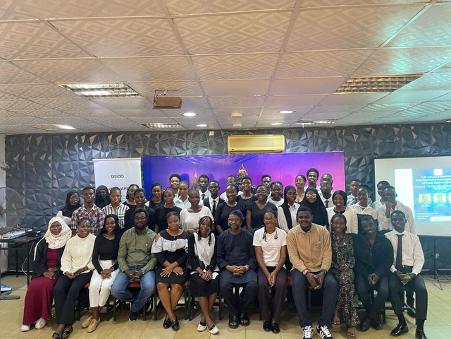
Fig 4: Training of Mental Health Champions from three campuses.
Another initiative of the ACN is the Community At Reach for Support (ACN CAReS), a vibrant support community for students with lived experience, who run and coordinate the peer-to-peer support groups, share experiences and provide ongoing support. They also receive support from mental health professionals within the Asido Foundation. This has significantly reduced social isolation, internalized stigma as well as reduced the rate of relapses among members. ACN CAReS provides a safe haven for people, where they feel supported and not alone.
Following a spate of suicidal attempts on campus, the University of Ibadan chapter of the ACN organized “Matters That Matter”, in September 2023, an Arts in Mental Health initiative that combined stage play, visual arts, dance, drama, oratory, and music to educate students on mental health and spark #unashamed conversations about mental health. This event attracted over 1000 attendees with immediate benefits including the creation of a Mental Health Committee by the Students Union Government. Furthermore, the University Management has also established a Student Mental Health Committee, which is co-chaired by the Founder of Asido Foundation, Jibril Abdulmalik, and they have recently developed the first Student Mental Health Policy for the university.
Beyond advancing mental health advocacy and addressing the mental health needs of the youthful population, Asido Campus Network has become a safe place, a networking opportunity, and a leadership breeding ground that has trained over 10,000 students since 2020 as Mental Health Champions.
In conclusion, Africa is the continent with the largest youth population in the world, and the need to invest in the mental health of her youth is not just a public health concern but a pressing socioeconomic need. The Asido Foundation is playing a leading role in this direction via the Asido Campus Network as a pragmatic model for empowering youths to reach out to other youth in the most effective manner; while receiving professional training and guidance from the Asido Foundation. But we can’t do this alone. Stakeholders such as the government at both federal and state levels, religious clergy, community and traditional leaders, and the school management as well as the media all have pivotal roles to play in tackling the challenges of youth mental health. The Asido Campus Network model of the Asido Foundation is easily replicable and we recommend it to other LMICs, even as we strive to expand into more institutions across Nigeria and to other African countries in the near future.
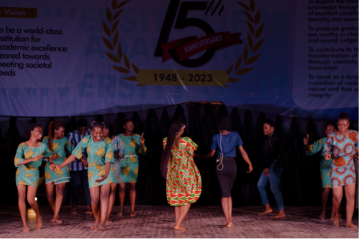
Fig 5: Performers at Matters That Matter in 2023.
This article represents the view of its author(s) and does not necessarily represent the view of the IACAPAP's bureau or executive committee.

